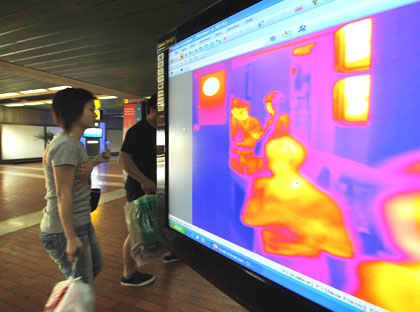Britain launches swine flu awareness campaign
 Sydney - Australia's international airports began installing thermal-imaging scanners Thursday to try to identify incoming passengers who might have contracted swine flu.
Sydney - Australia's international airports began installing thermal-imaging scanners Thursday to try to identify incoming passengers who might have contracted swine flu.
Hundreds have been tested for the deadly H1N1 strain of the virus, but there have been no confirmed cases in Australia.
The captains of aircraft arriving from the Americas are obliged to report to quarantine officers any passengers they suspect of having influenza. Passengers are also obliged to fill in a form detailing their health.
Health Minister Nicola Roxon said the scanners, which detect whether a passenger has a high temperature, would cause delays and disruptions at airports.
"We do believe that the inconvenience will be worthwhile in helping to add to the protection of our country from swine flu," she said.
Charles Sturt University lecturer Ross Cutler tried to douse the false notion that swine flu could be caught from eating pork. Butchers reported that customers were avoiding pork and pork products.
"There's absolutely no evidence that this disease is transmitted in meat, in pork or any pork product, and there's no evidence at all or any suggestion that it's even being transmitted in pigs, even in Mexico," Cutler said.
Mexico has been the country worst affected by the swine-flu outbreak. It has confirmed 91 human swine-flu infections and eight deaths although 159 people have died there recently of the flu. The United States has reported one death and 64 infections.
Other countries reporting infections but no deaths are New Zealand, Canada, Britain, Spain, Germany, Israel, Austria, Switzerland and Peru.
The outbreak is of a hitherto unknown flu strain, which has genetic elements from three species, pigs, birds and humans.